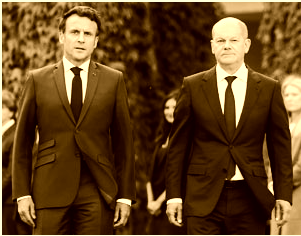The foundation of the European Union is cracking at the seams
Key relations between Germany and France for the entire European Union, as it turned out, are under threat. The leaders of the two countries held special talks on Wednesday to resolve differences. What exactly hinders the long-established, it would seem, interaction between the two largest economies of the EU, and what is the significance of what is happening for Russia?
Contradictions are growing in Europe: relations between the two largest eurozone states, Germany and France, are “at the bottom”, according to the German newspaper Die Welt. In an attempt to negotiate and come to at least some kind of mutually beneficial compromise, Emmanuel Macron organized a meeting with Chancellor Scholz at the Elysee Palace on October 26 (French sources officially call it “dinner”, but, of course, this is something more). In parallel, an extremely important meeting of German and French ministers was to be held at the Fontainebleau Palace, but it was unexpectedly canceled, which produced the effect of a bolt from the blue on the Western media.
The Liberation journalists, explaining what was happening, could not resist the sarcastic remark that the list of countries’ claims to each other is “long, like a day without a pretzel.” In short, it includes the most important issues for Europe at the moment: Russian gas, the energy crisis, arms supplies to Ukraine and inflation.
The leaders of France and Germany have a different approach to all these issues, and they intend to solve problems in different ways. When Macron says: “I believe that neither Germany nor Europe should now isolate themselves from the rest,” in Berlin they retort that the French like to refer to European solidarity when it benefits France, but immediately forget about solidarity when it plays into the hands of France Germany.
For example, while the Germans were planning to build a gas pipeline between Germany and Spain, the French seized the initiative. Apparently, they have already agreed with Spain and Portugal on another BarMar pipeline, which will run between Marseille and Barcelona along the bottom of the Mediterranean Sea. This means, firstly, that the German project will not be implemented – it no longer makes sense – and secondly, that German business will suffer significant losses in this regard.
The parties cannot agree on security issues either. Berlin proposes to create a common missile defense system in Europe, and 14 countries, including Great Britain, the Baltic States, Finland and Holland, are already ready to join this project. That is, many, but not France. The fact is that the German project is going to use Israeli developments, while in France they would like to rely on their own ideas and partly on Italian ones.
As the same Die Welt writes, in France they now say about Germany: “Germany puts itself above all”, and, as a result, they feel disappointment, irritation, bitterness. For example, a German plan to spend 200 billion euros to keep down gas prices in Germany caused great irritation in France.
First, before announcing it, Scholz for some reason did not consult with respected European partners. (Curiously, the chancellor had a perfectly good reason for this – he was ill with the coronavirus, but he also refused videoconferencing and did not even take the time to talk on the phone with French Prime Minister Madame Born.) Secondly, if Germany manages to keep the previous price level, this will cause inequality in the eurozone and a possible outflow of industry to German territory, which also does not suit the neighbors.
It is worth recalling that France and Germany competed and fought each other for hundreds of years. Only in the last century and a half, this resulted in the Franco-Prussian war of 1870-1871, which France lost miserably. Then there were two world wars, and the first France won with difficulty, having suffered enormous human losses, and during the second, it simply surrendered to Hitler’s army. So the Germans, in addition to the current disagreements, have historical reasons to at least not trust their neighbors.
Former French Prime Minister (and Foreign Minister) Dominique de Villepin, in an interview on Radio France Inter, assessed the prospects for resuming cooperation between the two countries pessimistically. “The France-Germany couple has broken up, their union is paralyzed,” which he regrets, since “at this historical moment we cannot afford a weakened and divided Europe … A strong and united Europe always begins with a strong German-French alliance.”
France is accustomed to seriously consider itself as a force to be reckoned with in the world, but next to Germany, which is strengthening, including militarily, the French will no longer be able to play first fiddle. And this is not just a blow to pride – this is the economy, which will sag, and the loss of its former prestige, and pushing it to the margins of world politics.
But no one will admit it, and, reporting on the meeting with Macron (which ended up taking about three hours), Scholz noted that France and Germany are “very close.” And the press secretary of the French president, Olivier Veran, announced that “the Franco-German friendship is still alive.” France also announced that working groups will be set up on controversial issues of energy, defense and innovation. However, observers did not fail to note the general nature of the statements made, which means that the contradictions between the countries have not been resolved and are unlikely to be resolved in the near future.
